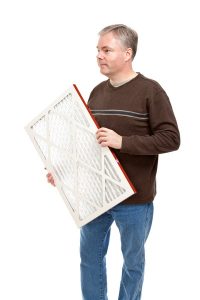 If there is one single step that you can take to keep your air conditioner in Plano, TX, in the best working condition possible, then it is definitely scheduling routine air conditioning maintenance. If there is one single task that you can handle on your own to help your AC succeed, then it is definitely changing your air filter.
If there is one single step that you can take to keep your air conditioner in Plano, TX, in the best working condition possible, then it is definitely scheduling routine air conditioning maintenance. If there is one single task that you can handle on your own to help your AC succeed, then it is definitely changing your air filter.
Yes, really. It’s that important.
While your air filter will be changed during your annual AC tune-up, it is important to remember that once a year just is not going to cut it. Your air filter will typically need to be replaced every 1-3 months, depending upon a number of different environmental factors. Failure to keep a fresh filter in place can have much more serious consequences than other homeowners realize.
In today’s post, we’ll clarify precisely what this standard air filter in your AC does, and the risks of failing to keep a fresh filter in your home cooling system.
Don’t Judge Your Filter By Your Indoor Air Quality!
One common misconception among homeowners is that the air filter in their air conditioning systems is there to improve indoor air quality throughout their homes. That’s not actually true, though we understand where the misconception comes from. Yes, air filters clean air—and the standard filter in your AC does serve this function. However, these air filters are not nearly efficient enough to improve indoor air quality throughout your entire home. Nor are they intended to be.
To resolve issues with indoor air quality throughout your home, you may choose to use a more efficient, designated air filtration system. These standard filters, however, are really there to protect the air conditioning system itself. They trap those pollutants that could otherwise build up on sensitive components within your home cooling system, putting its performance quality and its overall condition at risk.
Symptoms and Consequences of Dirty Air Filters
If your air filter is too dirty, you’ll start to notice many different issues developing with your system and its operation. These include the following.
- Reduced cooling output. The harder that your system has to work to force cooled air through a dirty air filter, the more overall cooling output will decline.
- Increased energy costs. While cooling performance falls, you’re going to wind up paying more for that weaker performance. That’s because your system is using more energy to distribute cooled air throughout your home.
- Ice on the coil. Refrigerant evaporates in the indoor AC coil, which allows the system to remove heat from the air. If the filter is too dirty, airflow is restricted and the coil gets too cold. This can lead to condensation on the coil freezing up.
- Short cycling. If airflow is restricted enough, then your system may run in short bursts. This means that it is trying to protect itself from damage as it overheats, and that means that excessive wear and tear is likely to result in damages that could have been avoided by simply replacing the filter.
Schedule your AC services with Hutchins Plumbing & Air Conditioning. Get it done right… Right now!









